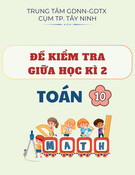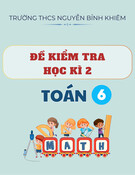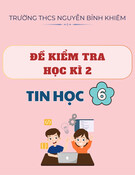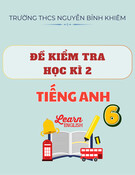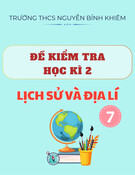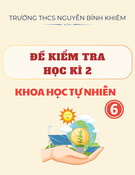
Đề thi thử Đại học, Cao đẳng môn tiếng Anh - Đề số 5
Mark the letter A, B, C or D on your answer sheet to indicate the word whose the
underline part differs from the other three in pronunciation in each of the following
questions.
Question 1. A. entrance B. paddy C. bamboo D. banyan
Question 2. A.shortage B.storage C.garage D.encourage
Mark the letter A, B, C or D on your answer sheet to indicate the word that differs
from the rest in the position of the main stress in each of the following questions.
Question 3. A. elaborately B. mysteriously C. originally D. necessarily
Question 4. A. argumentative B. Psychological C. Contributory
D. hypersensitive
Question 5. A. sandals B. dental C. canal D. rental
Mark the letter A, B, C or D on your answer sheet to indicate the correct answer to
each of the following questions.
Question 6. Unless we take immediate precautions, we‘ll not be able to ________ the
epidemic.
A. surround B. contain C. hold D. get away
Question 7.I can’t _________ of a word he is saying.
A. comprehend B. understand C. grasp D. make sense
Question 8. Although the hours are longer, John earns more in his new job.
A. gets on B. brings in C. makes out D. takes up
Question 9. ____________ you to be offered that job, would you have to move to
another city?
A. Provided that B. Should C. Were D. Had
Question 10. After her mother died, she was raised by her grandparents.
A. grown up B. brought up C. come into D. put up
Question 11. Jump in the car. There’s enough ______ for you.

A. room B. place C. space D. chair
Question 12. A: Could I speak to Susan please?
B: _____________ .
A. Talking B. Speaking C. Calling D. Answering
Question 13.Having opened the bottle, _____________ for everyone.
A. The drink was poured B. Mike poured the drink
C. Mike pouring the drink D. The drink was being poured
Question 14. It is time every student _________work harder for the coming exam..
A. has to B. had to C. must D. should
Question 15. The concert was ____________ because of the heavy rain.
A. put out B. called off C. run out D. set off
Question 16. ‘’ Would you mind turning down your stereo ?’’ - “ …….”
A. I’m really sorry! I ‘m not paying attention B. Oh! I’m sorry! I didn’t realize that
C. No. I don’t D. Yes, I do
Question 17. Instead of being excited about the good news, Ted seemed to be
____________.
A. ignorant B. indifferent C. unlikely D. unexpected
Question 18.The only people she looks ____ to are her parents.
A. after B. for C. at D. up
Question 19. The doctor who is _______ tonight in the general hospital is Mr. Brown.
A. on turn B. on tour C. on call D. on work
Question 20. My old friend and colleague, John, __________ married.
A. have just got B. has just got C. just have got D. just has got
Question 21. The doctor gave the patient _______ examination to discover the cause of
his collapse.
A. a thorough B. an exact C. a universal D. a whole
Question 22.___________ broken into when we were away on holiday.
A. It was our house B. We had our house
C. Thieves had our house D. Our house had

Question 23. Nothing can ____________ the loss of the child.
A. make up with B. make up for C. do with D. come up with
Question 24. Conservationists ______________ that experiments on animals be
stopped.
A.banned B. complained C. said D.recommended
Question 25. ____________ the noise and pollution in the city, the Browns move to the
countryside.
A. Be tired of B. Being tired of C. Tired of D. Were tired of
Question 26. Please look through these papers ... your pleasure
A. on B. in C. for D. at
Question27. The house is found ___________________down
A. to burn B. burning C. having burned D. to have been burned
Question 28. The ground is wet. It _______________ rained last night.
A. must B. must have C. may have D. might have
Question 29. ___________ members of my family has a share in doing household
chores.
A. Every B. Each of the C. All D. None of
Question 30. I don’t like John. His _________ complaints make me angry.
A. continual B. continuous C. constant D. permanent
Mark the letter on your answer sheet to show the underlined part that needs correcting.
Question 31. The (A) reason he wants to take a leaving (B) of absence is that he (C)
needs a complete (D)
rest.
Question 32.His boss (A) has asked (B) him to respond (C) immediately (D) this fax.
Question 33. It is the writing (A) English that (B) causes difficulties (C) to foreigners
(D).
Question 34.The (A) diameter of the Sun is more than (B) one hundred times (C) greater
than (D) the Earth.
Question 35.Foreign students who are doing (A) a decision about which (B) school to

attend (C) may not know exactly where the choices (D) are located.
Read the following passage and mark the letter A, B, C or D on your answer sheet to
indicate to choose the word or phrase that best fits each of the numbered blanks
from 36 to 45
Most traditional human life in deserts is nomadic. It (36) ______ in hot deserts on finding
water, and on following infrequent rains to (37) ______ grazing for livestock. In cold
deserts, it depends on finding good hunting and fishing grounds, on sheltering from
blizzards and winter (38) ______, and on storing enough food for winter. Permanent
settlement in both kinds of deserts requires permanent water, food sources and adequate
shelter, or the technology and energy sources to (39) ______ it.
Many deserts are flat and featureless, lacking landmarks, or composed of repeating
landforms such as sand (40) ______ or the jumbled ice-fields of glaciers. Advanced skills
or devices are required to navigate through such landscapes and (41) _____ travelers may
die when supplies run (42) ______ after becoming lost. In addition, sandstorms or
blizzards may cause disorientation in severely-reduced visibility.
The (43) ______ represented by wild animals in deserts has featured in explorers'
accounts but does not cause higher (44) ______ of death than in other environments such
as rainforests or savanna woodland, and generally does not affect human distribution.
Defense against polar bears may be advisable in some areas of the Arctic. Precautions
against snakes and scorpions in choosing (45) ______ at which to camp in some hot
deserts should be taken.
Question 36. A. locates B. selects C. follows D. depends
Question 37. A. earn B. demand C. obtain D. require
Question 38. A. extremes B. poles C. tops D. heights
Question 39. A. grow B. supply C. comfort D. bring
Question 40. A. dunes B. piles C. valleys D. stores
Question 41. A. inconsistent B. incapable C. inexperienced D. independent
Question 42. A. of B. out C. in D. over
Question 43. A. danger B. dangerous C. endanger D. endangered

Question 44. A. level B. rate C. scale D. standard
Question 45. A. sight B. lies C. sites D. seats
Read the following passage and mark the letter A, B, C or D on your answer sheet to
indicate the correct answer to each of the questions from 46 to 55.
Ranked as the number one beverage consumed worldwide, tea takes the lead over
coffee in both popularity and production with more than 5 million metric tons of tea
produced annually. Although much of this tea is consumed in Asian, European, and
African countries, the United States drinks its fair share.
According to estimates by the Tea Council of the United States, tea is enjoyed by no less
than half of the U.S. population on any given day. Black tea or green tea – iced, spiced,
or instant – tea drinking has spurred a billion-dollar business with major tea producers in
Africa and South America and throughout Asia.
Tea is made from the leaves of an evergreen plant, Camellia sinensis, which grows tall
and lush in tropical regions. On tea plantation, the plant is kept trimmed to approximately
four feet high and as new buds called flush appear, they are plucked off by hand. Even in
today’s world of modern agricultural machinery, hand harvesting continues to be the
preferred method. Ideally, only the top two leaves and a bud should be picked. This new
growth produces the highest quality tea.
After being harvested, tea leaves are laid out on long drying racks, called withering racks,
for 18 to 20 hours. During this process, the tea softens and becomes limp. Next,
depending on the type of tea being produced, the leaves may be crushed or chopped to
release flavor, and then fermented under controlled conditions of heat and humidity. For
green tea, the whole leaves are often steamed to retain their green color, and the
fermentation process is skipped. Producing black teas requires fermentation during which
the tea leaves begin to darken. After fermentation, black tea is dried in vats to produce its
rich brown or black color.
No one knows when or how tea became popular, but legend has it that tea as a beverage
was discovered in 2737 B.C. by Emperor Shen Nung of China when leaves from a


![Đề thi Tiếng Anh có đáp án [kèm lời giải chi tiết]](https://cdn.tailieu.vn/images/document/thumbnail/2025/20250810/duykpmg/135x160/64731754886819.jpg)
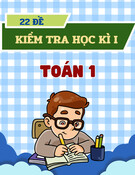
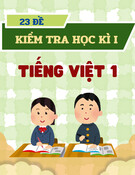

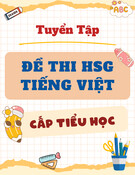
![Đề thi học kì 2 Vật lý lớp 11: Đề minh họa [Mới nhất]](https://cdn.tailieu.vn/images/document/thumbnail/2025/20250709/linhnhil/135x160/711752026408.jpg)
